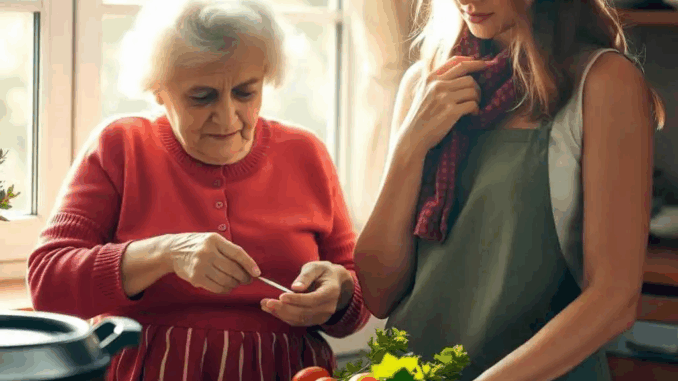

I could only watch in amazement as Lucía prepared a salad—my daughter-in-law had revolutionized my life.
In a small town near Toledo, where the scent of lemon trees in bloom mingles with the dust of the summer roads, my once peaceful and orderly existence was suddenly shaken. My name is Carmen Álvarez, I am sixty-two years old, and I found myself facing a daughter-in-law who, unwittingly, made me question everything I believed. Her gesture during dinner was not just a surprise, but a real blow that revealed the chasm between us.
**A new member of the family**
When my son Alejandro brought Lucía home, she was full of hope. Young, smiling, with a sparkle in her eyes—she seemed the perfect match for my boyfriend. They married three years ago, and ever since, Lucía has been part of our family. I tried to be a good mother-in-law: I helped in the kitchen, shared recipes, even took care of their little daughter, Martina, when they were busy. But from the beginning, I noticed something different about her—an independence that, while admirable, worried me.
Lucia never asked for advice, never complained, never fussed. She did everything her way, quietly but confidently. I attributed it to youth, thinking that with time she’d warm up to me, that she’d learn to value my traditions. But last night’s dinner proved me wrong, and that mistake hurt more than I imagined.
**An unexpected dinner**
Yesterday, Alejandro and Lucía invited me to dinner. I arrived at eight, as agreed, with a freshly baked apple pie. Lucía greeted me with a smile, but something sparkled in her eyes—as if she had a plan I couldn’t quite grasp. We sat down at the table, and I waited for her, as always, to praise my dishes. Instead, she stood up, opened the refrigerator, and took out ingredients: two boiled eggs, four tomatoes, three cucumbers, and half a chopped onion.
I watched her in disbelief. Lucía expertly chopped everything, mixed it in a large bowl, dressed it with olive oil, and served it. “Here, Carmen, enjoy,” she said with a slight smile. I froze. That salad, made with what was left, seemed so simple, so… improvised. And my cake, which I had spent hours creating, was almost untouched. Alejandro ate Lucía’s plate with gusto, while I felt my indignation growing within me.
**A blow to traditions**
That salad wasn’t just food, but a symbol. All my life I cooked with my soul: stews, tortillas, empanadas—everything so my family would feel my love. My mother taught me that food is about care, about tradition, about heritage. And Lucía, with a single gesture, had erased it all. Her sloppy salad, her confidence, her indifference to my efforts… Everything screamed: “Your customs don’t matter to me.” I felt displaced, as if another woman had taken my place in the family.
Alejandro, my son, raised with so much love, didn’t even notice my distress. He praised her, joked, while I gripped my fork and choked back tears. Why didn’t she stand up for me? Why didn’t she say, “Mom, your cake is the best”? Then I understood that Lucía hadn’t just entered our family—she was rewriting its rules, pushing me aside.
**Pain and reflection**
When I got home, I couldn’t sleep. Lucía’s salad floated before my eyes like a mockery. I remembered how confidently she ran the kitchen, how Alejandro looked at her with admiration. Was I just an old woman with old-fashioned habits? Did no one need my cakes, my care, my love anymore? I felt betrayed—not only by Lucía, but by my son, who remained silent and supported her.
But deep down, I knew Lucía didn’t mean to hurt me. She was different—modern, free, alien to my traditions. Her plan wasn’t against me, but rather in favor of her own path. Still, the pain lingered. I had given Alejandro everything, and now I felt like I was losing him. Lucía had unwittingly taken my place in his heart, and it tore me apart.
**Now what?**
Today I decided to talk to Alejandro. I need to know if he still values my dedication or if he sees me as a burden. I dread that conversation—I dread hearing that he prefers Lucía’s salads to my cakes. But I can’t keep quiet. At 62, I want to feel loved, to know that my children and grandchildren appreciate me not just for my cooking, but for who I am.
This story is my cry to be seen. Maybe Lucía didn’t mean to hurt me, but her salad became a symbol of changes I’m not ready to accept. I don’t know how to find my place in my son’s new family, but I won’t give up. My love for Alejandro and Martina is stronger than any resentment, and I will find a way to continue in their lives—even if I have to learn how to make salads.
Để lại một phản hồi